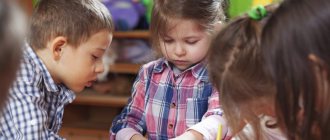The essence of social and personal development of a preschooler
Definition 1
Social and personal development is the formation of a child’s correct attitude towards himself and the environment, as well as his social motives and needs.
In accordance with the Federal State Educational Standard for Additional Education, social and personal development is included in the educational area “Social and communicative development” and is aimed at:
- children’s assimilation of values and norms accepted in modern society;
- formation and development of communication skills through active interaction of the child with peers and adults;
- formation of skills of independence, self-education, self-regulation and direction of one’s actions;
- development of emotional and social intelligence, empathy and emotional responsiveness (empathy);
- formation of readiness to carry out joint activities with peers;
- formation of respect for the surrounding people, the Motherland, history and traditions of the people;
- developing pride and a sense of belonging to one’s family, nationality and community;
- formation of a positive attitude towards various types of labor and creative activities;
- formation of the foundations for safe behavior in everyday life, society and nature.
Are you an expert in this subject area? We invite you to become the author of the Directory Working Conditions
Within the preschool educational institution, the social and personal development of preschool children is carried out in the following forms:
- educational activities;
- joint activities of the teacher and children;
- joint activities of pupils;
- individual types of work of a teacher with children.
Currently, modern kindergartens pay great attention to solving the problem of social and personal development of preschool children. This is due to the fact that it is aimed at shaping the child’s attitude towards the world around him and himself, contributes to the development of social needs and motives, and the formation of self-knowledge. Social and personal development requires a considerable amount of labor from the teacher and the manifestation of pedagogical professionalism, which contributes to obtaining a visible result.
What is social development
What does the term “social development” (or “socialization”) mean? This is a process in which a child adopts the traditions, values, and culture of the society in which he will live and develop. That is, the baby undergoes the basic formation of his initial culture. Social development is carried out through communication with peers and adults. When communicating, the child begins to live by the rules, trying to take into account his interests and interlocutors, and adopts specific behavioral norms. The environment surrounding the baby, which also directly influences his development, is not just the outside world with streets, houses, roads, objects. The environment is, first of all, people who interact with each other according to certain rules that prevail in society. Any person who meets a child’s path brings something new into his life, thus directly or indirectly shaping him. The adult demonstrates knowledge, skills and abilities regarding how to interact with people and objects. The child, in turn, inherits what he sees and copies it. Using this experience, children learn to communicate in their own little world with each other.
It is known that individuals are not born, but become. And the formation of a fully developed personality is greatly influenced by communication with people. That is why parents should pay enough attention to developing a child’s ability to find contact with other people.
In the video, the teacher shares his experience of socializing preschoolers
“Did you know that the main (and first) source of a child’s communicative experience is his family, which is a “guide” to the world of knowledge, values, traditions and experience of modern society. It is from parents that you can learn the rules of communication with peers and learn to communicate freely. A positive socio-psychological climate in the family, a warm homely atmosphere of love, trust and mutual understanding will help the child adapt to life and feel confident.”
Tasks of social and personal development of preschool children
The main tasks of social and personal development of preschool children:
- Formation in children of a complete picture of the social world, themselves and their place in society.
- Nurturing an active life position and adequate social feelings.
- Forming an idea about the people around you, yourself, nature, man-made works, etc.
Finished works on a similar topic
Course work Social and personal development of preschool children 400 ₽ Abstract Social and personal development of preschool children 220 ₽ Test work Social and personal development of preschool children 250 ₽
Receive completed work or specialist advice on your educational project Find out the cost
The process of social and personal development continues in a person throughout his life. However, its foundation is laid in preschool childhood. It is during this age period that the first components of social behavior are formed in the child, and emotional, personal and behavioral lines appear. Children are always active and strive to perform various types of activities; the task of the educator (parent) is not to slow them down in this endeavor, but, on the contrary, to motivate them for constant development and improvement, not to let the desire to develop and learn fade away. A large role in this direction is played by various types of games that the child plays not only with peers, but also with adults and even with himself.
It is a mistaken opinion that a child should constantly be doing something useful, and not just playing. However, it is the game that is the leading activity of the child. In play, a child learns about the world, develops, and develops the necessary skills and abilities. During games, children's development moves at a rapid pace: mental, social, emotional. Every teacher, organizing the social and personal development of preschool children, must make maximum use of the opportunities of play for the social development of children.
Stages of child social development
- Infancy. Social development begins in a preschooler in infancy. With the help of a mother or another person who often spends time with the newborn, the baby learns the basics of communication, using means of communication such as facial expressions and movements, as well as sounds.
- From six months to two years. The child’s communication with adults becomes situational, which manifests itself in the form of practical interaction. A child often needs the help of his parents, some kind of joint action for which he turns.
- Three years. At this age, the baby already demands society: he wants to communicate in a group of peers. The child enters the children's environment, adapts to it, accepts its norms and rules, and parents actively help with this. They tell the preschooler what to do and what not to do: whether it is worth taking other people’s toys, whether it is good to be greedy, whether it is necessary to share, whether it is possible to offend children, how to be patient and polite, and so on.
- From four to five years. This age period is characterized by the fact that children begin to ask an infinite number of questions about everything in the world (to which adults do not always have answers!). A preschooler’s communication becomes brightly emotionally charged and aimed at cognition. The baby’s speech becomes the main way of his communication: using it, he exchanges information and discusses the phenomena of the surrounding world with adults.
- From six to seven years. The child’s communication takes on a personal form. At this age, children are already interested in questions about the essence of man. This period is considered the most important in the development of the child’s personality and citizenship. A preschooler needs an explanation of many life moments, advice, support and understanding from adults, because they are role models. Looking at adults, six-year-olds copy their style of communication, relationships with other people, and the characteristics of their behavior. This is the beginning of the formation of your individuality.
Social adaptation of children
Social adaptation is a prerequisite and result of successful socialization of a preschooler.
It happens in three areas:
- activity
- consciousness
- communication.
The field of activity implies a variety and complexity of activities, good mastery of each type, its understanding and mastery of it, the ability to carry out activities in various forms.
Indicators of a developed sphere of communication are characterized by an expansion of the child’s social circle, deepening the quality of its content, mastery of generally accepted norms and rules of behavior, and the ability to use its different forms and types suitable for the child’s social environment and in society.
The developed sphere of consciousness is characterized by work on forming the image of one’s own “I” as a subject of activity, understanding one’s social role, and forming self-esteem.
During socialization, the child, along with the desire to do everything as everyone else does (mastery of generally accepted rules and norms of behavior), manifests a desire to stand out and show individuality (development of independence, one’s own opinion). Thus, the social development of a preschooler occurs in harmoniously existing directions:
- socialization
- individualization.
In the case when, during socialization, a balance is established between socialization and individualization, an integrated process occurs aimed at the successful entry of the child into society. This is social adaptation.
Development of social skills
The development of social skills in preschoolers has a positive effect on their activities in life. General good manners, manifested in graceful manners, easy communication with people, the ability to be attentive to people, try to understand them, sympathize, and help are the most important indicators of the development of social skills. Also important is the ability to talk about one’s own needs, set goals correctly and achieve them. In order to direct the upbringing of a preschooler in the right direction of successful socialization, we suggest following aspects of the development of social skills:
- Show your child social skills. In the case of babies: smile at the baby - he will answer you the same. This will be the first social interaction.
- Talk to your baby. Respond to the sounds made by the baby with words and phrases. This way you will establish contact with the baby and soon teach him to speak.
- Teach your child to be attentive. You should not raise an egoist: more often let your child understand that other people also have their own needs, desires, and concerns.
- When raising, be gentle. In education, stand your ground, but without shouting, but with love.
- Teach your child respect. Explain that items have their value and should be treated with care. Especially if it's someone else's things.
- Teach to share toys. This will help him make friends faster.
- Create a social circle for your baby. Strive to organize your child’s communication with peers in the yard, at home, or in a child care facility.
- Praise good behavior. The child is smiling, obedient, kind, gentle, not greedy: what is not a reason to praise him? It will reinforce your understanding of how to behave better and acquire the necessary social skills.
- Talk to your child. Teach preschoolers to communicate, share experiences, and analyze actions.
- Encourage mutual assistance and attention to children. Discuss situations in your child’s life more often: this way he will learn the basics of morality.
Social factors
What influences a child's socialization?
- family
- kindergarten
- child's environment
- children's institutions (kindergarten, development center, clubs, sections, studios)
- child's activities
- television, children's press
- literature, music
- nature
All this makes up the child’s social environment.
When raising a child, do not forget about the harmonious combination of various ways, means and methods.
Social maladjustment
If, when a child enters a certain group of peers, there is no conflict between generally accepted standards and the child’s individual qualities, then it is considered that he has adapted to the environment. If such harmony is disturbed, the child may develop self-doubt, isolation, depressed mood, reluctance to communicate, and even autism. Children rejected by a certain social group are aggressive, uncommunicative, and have inadequate self-esteem.
It happens that a child’s socialization is complicated or slowed down for physical or mental reasons, as well as as a result of the negative influence of the environment in which he grows up. The result of such cases is the emergence of antisocial children, when the child does not fit into social relationships. Such children need psychological help or social rehabilitation (depending on the degree of difficulty) in order to properly organize the process of their adaptation to society.


